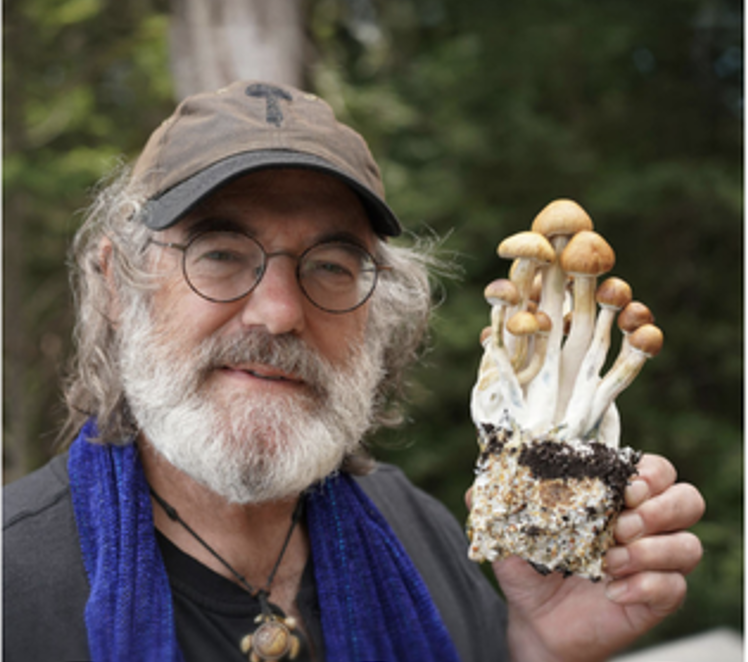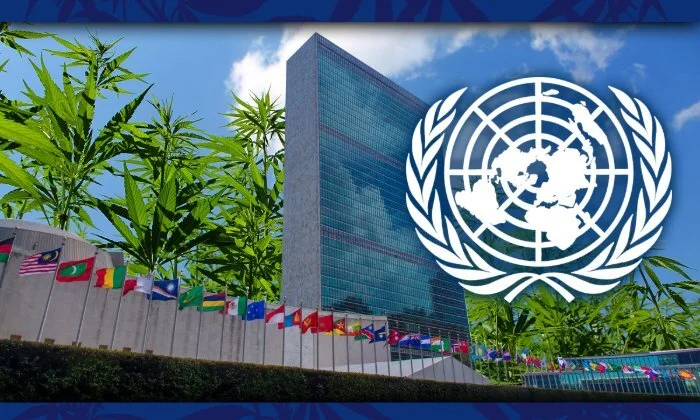Paul Stamets Speaks at UN on the Power of Mushroom Mycelium
OLYMPIA, Wash. (Nov. 12, 2025) — Internationally renowned mycologist Paul Stamets recently addressed a distinguished audience at the United Nations Headquarters in New York City as part of a global gathering highlighting transformative leaders advancing human and planetary health.*
Stamets' talk explored the powerful immune-supporting properties of Turkey Tail and Agarikon—two mushroom species with extensive research demonstrating their ability to bolster immune function. Drawing on decades of study and discovery, Stamets emphasized how the mycelium of these mushrooms holds profound potential for supporting both personal wellness and the health of our planet.*
"Speaking at the United Nations was truly an honor," Stamets said. "The immense potential of Agarikon and Turkey Tail mushroom mycelium to support immune function cannot be understated. The opportunity to share such remarkable findings in front of a global audience is a true testament to fungi's inextricable role as stalwart allies in the health of both people and planet."*
For 50 years, Stamets has devoted much of his work as a mycologist to researching and advocating for the essential function that fungi have as cultivators of life on this planet. As Founder, Member, and Owner of Fungi Perfecti, LLC, Makers of Host Defense® Mushrooms™, Stamets directs his company to reinvest $1 million annually into mycological research and discovery.*
Stamets' efforts include organizing clinical trials on the efficacy of mushroom mycelium to support human health and contributing to numerous peer-reviewed scientific journal articles in the field of mycology. As owner of Fungi Perfecti and Host Defense, he and his team have cultivated the world's largest Agarikon culture library in a pursuit to preserve the at-risk species.*
"No other company in the mushroom supplement space has contributed more to the field of mycology or fungi for ecological preservation than Fungi Perfecti," Stamets said. "I've ensured that our work has always been in service to science, sustainability, and discovery—this moment at the United Nations stands as a milestone of this lifelong mission."
About Fungi Perfecti, LLC—Makers of Host Defense® Mushrooms™
Fungi Perfecti, LLC is a family-owned company founded by internationally renowned mycologist Paul Stamets, who launched Host Defense Mushrooms under Fungi Perfecti with the goal of building a bridge between people and fungi. Host Defense is now a leading mushroom supplement brand in the U.S., specializing in mushroom mycelium-based supplements designed to support human health. Its product line reflects the company's commitment to sustainability, scientific integrity, research, and education.*
Fungi Perfecti has become synonymous with cutting-edge mycological research and solutions—from water filtration (mycofiltration) and ecological rehabilitation (mycoremediation) to combating Colony Collapse Disorder in bees. A Certified B Corporation, Fungi Perfecti is third-party designated as Climate Positive, offsetting 110% of its carbon emissions, and is a certified Leading Living Wage Employer. Follow Host Defense and Fungi Perfecti on TikTok, Instagram, Facebook, and LinkedIn.
*These statements have not been evaluated by the Food and Drug Administration. These products are not intended to diagnose, treat, cure or prevent any disease.
Media Contact
Steven Hoffman, Compass Natural, steve@compassnatural.com, tel 303.807.1042
Ukraine Invasion Leads to Spike in World Food Prices, Disruption of Conventional and Organic Farming
Ukraine Invasion Leads to Spike in World Food Prices, Disruption of Conventional and Organic Farming
This article originally appeared in Presence Marketing’s May 2022 Industry Newsletter
By Steven Hoffman
Russia’s invasion of Ukraine in February has become a costly war not only in terms of the devastating loss of lives, but, also, as Ukraine – known as the “world’s breadbasket” – is a major producer of conventional and organic crops such as wheat, barley, sunflower oil and more, it also has resulted in major disruptions to agriculture and trade, and now, the highest food prices the world has ever seen.
Photo: Wikimedia Commons
The United Nations Food and Agriculture Organization (FAO) in April warned that food prices could rise by up to 20% as a result of the conflict in Ukraine, raising the risk of increased malnutrition around the world, as well as social unrest. Tracking the world’s most-traded food commodities, FAO reported that food prices are at their highest since record-keeping began 60 years ago, jumping 13% in March, following February’s record rise.
According to the U.N.’s Food Prices Index, the prices for vegetable oils have risen 23%, while cereals were up 17%. Sugar rose 7%, meat was up 5%, while dairy, which has been less affected by the war, climbed 3%. Food commodity prices were already at a 10-year high before the war in Ukraine because of global harvest issues, the U.N reported.
Russia and Ukraine alone account for 30% of the world’s trade in wheat, 32% of barley, 17% of corn, and over 50% of the world’s market for sunflower oil and seeds. In fact, Ukraine’s flag in part represents blue skies over fields of wheat. And, as the war has choked off supplies from Ukraine, the world’s biggest exporter of sunflower oil, that also means the costs of alternatives have climbed.
Ukraine Planting Season Disrupted
As the war drags into Spring, and with Russia’s ongoing campaign targeting agricultural zones to the east, there’s a concern about whether Ukrainian farmers can plant much of anything this year. And if they do get their crops in the ground, production could be limited due to scarcity of seed, fertilizer, fuel and other inputs, much of which comes in from port cities including Mariupol, which are under siege. Ukraine alone exported more than $27 billion in agricultural products to the world in 2021, NPR reported.
According to Jörg-Simon Immerz, head of the grain trading at BayWA, Germany’s largest agricultural trading group, “Zero grain is currently being exported from the ports of Ukraine—nothing is leaving the country at all.” In addition, Deutsche Welle TV reported that since the invasion began, up to 300 ships have been stopped by Russian forces from departing the Black Sea, “leaving one of the key global trade routes for grain virtually blocked.”
The longer the war goes on, the more the impact on food exports will affect the world’s poorest countries. Many nations in Africa and the Middle East are largely dependent upon wheat imports from Russia and Ukraine; Lebanon gets 80% of its wheat from Ukraine, while Egypt gets 80% of its wheat from Ukraine and Russia. Somalia and Benin are 100% reliant upon wheat from these two nations currently at war. Deutsche Welle TV reported that the wheat shortages from Ukraine are being especially felt in eastern Africa where the price of bread and sunflower oil have more than doubled since the war began.
War Drives Food Inflation; Low Income Households Disproportionately Affected
Lower income households throughout the world, including the U.S., are being disproportionately affected by the drastic rise in food prices, triggered by two years of economic and supply chain disruptions resulting from the COVID-19 pandemic and exacerbated today by the Russia-Ukraine conflict.
According to Consumer Price Index data released in April by the U.S. Bureau of Labor Statistics, food-at-home prices rose 10% over the past year – the fastest pace since March 1981. Food and energy costs drove inflation to 8.5% in March compared to the same month a year ago, marking the highest rate in more than 40 years as consumers continue to feel the pinch of higher prices.
Meanwhile, grocers have tried to keep price increases from reaching consumers on such staple items as bread, meat and eggs, however, that strategy is becoming increasingly difficult, reports Food Dive. As a result, many consumers are opting for cheaper products over brand loyalty.
Analysts at Bank of America on April 21 predicted the impact of the Russia-Ukrainian conflict has yet to be fully felt in grocery stores. “Looking ahead, we think that consumers will continue to feel the pinch of elevated food inflation,” the analysts wrote. “While there has been a lot of attention on the shock from the Russia-Ukraine conflict, we believe that it is too early to see the impact at the grocery store…rather, it should lead to sustained price increases later this year.”
The Bank of America analysts reported that they expect U.S. food inflation to reach 9% by the end of 2022.
Fortune Magazine reported that Bank of America’s analysts noted that farmers, too, are dealing with spikes in the cost of inputs including fertilizers and pesticides, which have increased 50% in the past year alone, based on U.S. Bureau of Labor Statistics Producer Price Indexes. Russia was one of the world’s leading exporters of fertilizers in 2020, including urea and potash, according to the Observatory of Economic Complexity, and fertilizer prices have also been fueled by higher costs of natural gas, used in the production of nitrogen-based fertilizers.
“There are signs that companies are passing through higher costs,” the Bank of America team said, according to Fortune. “Margins look to be growing on both the wholesale and retail level, suggesting that companies have regained pricing power and are comfortable letting the consumer eat higher costs instead of them.”
Ukraine’s Organic Farming Regions Are Under Occupation
Ukraine is one of the world’s leading producers of organic crops. According to the European Commission, the country was the largest exporter of organic products to the EU in 2019, and the second leading exporter of organic products in the world, out of 123 countries.
In 2020, there were 462,225 hectares (1.1 million acres) of organic land in Ukraine, reported Organic Info Ukraine. However, much of the land under organic production is in areas where there are currently hostilities or occupation. “Since 24 February 2022 (the beginning of Russia’s full-scale invasion of Ukraine) the organic sector as well as the entire agrarian industry have been suffering from aggression. The biggest problem in many regions is access to land.” The Kherson region, for example, which is Ukraine’s largest organic region, is almost completely occupied by Russian troops, the organization noted.
Exports notwithstanding, humanitarian concerns also revolve around Ukraine’s farmers and the country’s ability to feed itself during the war. “Ukraine is a leading global supplier of agricultural products and exports a large amount of organic produce to different countries in Europe,” the Research Institute of Organic Agriculture (fiBL), based in Switzerland, said in a statement issued in mid-April.
“At the moment, FiBL and its partners (Organics International, Helvetas, and IFOAM Organics International) are looking into how they can adjust their project activities in Ukraine to meet the current needs of the Ukrainian organic sector. This is important to ensure that people of Ukraine have access to healthy nutritious food grown sustainably and that (organic) farmers do not lose their livelihoods. We are currently working with Ukrainian organic stakeholders and partners to ensure they can continue to grow and supply food and feed – now and in the future,” fiBL said.
The international organic food and agriculture community, including fiBL, IFOAM Organics International and others, is calling on its constituents to support the organic farming sector in Ukraine. Organic Info Ukraine published a “Statement on the Situation in the Ukrainian Organic Sector,” along with information on how to support organic producers and organic stakeholders in Ukraine during these critical times. Learn more and take action here.
# # #
Steven Hoffman is Managing Director of Compass Natural, providing brand marketing, PR, social media, and strategic business development services to natural, organic, sustainable and hemp/CBD products businesses. Compass Natural serves in PR and programming for NoCo Hemp Expo and Southern Hemp Expo, and Hoffman serves as Editor of the weekly Let’s Talk Hemp Newsletter, published by We are for Better Alternatives. Contact steve@compassnaturalmarketing.com.
UN Vote on Cannabis Could Impact THC and CBD Products Worldwide
This article originally appeared in the November 18, 2020 edition of the Let’s Talk Hemp Newsletter
By Steven Hoffman
The United Nations (UN) Commission on Narcotic Drugs (CND) is scheduled to vote on December 2 on the fate of cannabis recommendations made by the World Health Organization (WHO). The vote, reports Green Entrepreneur, will affect a series of recommendations for THC and CBD products, including pharmaceutical cannabis products such as Marinol, Syndros and Sativex.
“Among its recommendations, the WHO calls for all forms of THC to be removed from the drug convention of 1961, placing it with cannabis in Schedule I, the least restrictive classification by UN standards. Meanwhile, pharmaceutical cannabis medications would be placed in Schedule III,” Green Entrepreneur reported.
“In addition to the WHO’s recommendation on rescheduling cannabis and cannabis resins, another significant recommendation relates to ‘cannabidiol preparations,’ or CBD, Nushin Rashidian reported in Cannabis Wire. “The WHO already took a position in 2018 that pure CBD doesn’t warrant regulation. This latest recommendation is to put that position into effect by adding a note under the cannabis and cannabis resin entry under Schedule I that ‘preparations containing predominantly cannabidiol and not more than 0.2% of delta-9-tetrahydrocannabinol are not under international control,’” Rashidian wrote.
It should be noted that while Schedule I in the U.S. means the most stringent of regulated categories under the Controlled Substances Act (CSA), under the UN 1961 Single Convention on Narcotic Drugs, Schedule IV is the most restrictive and includes substances considered dangerous with limited or no medical value. “In removing cannabis and cannabis resin from Schedule IV, the WHO is effectively acknowledging its medical utility, Cannabis Wire reported.
Writing in Forbes, leading cannabis attorney Bob Hoban said, “The Single Convention on Narcotic Drugs of 1961 is an international treaty prohibiting production and supply of specific drugs and of drugs with similar effects — except under governmental license for specific purposes, such as medical treatment and research. Under the Single Convention, Cannabis (not ‘marihuana’ or ‘marijuana’) is categorized alongside cocaine and heroin as a dangerous substance with no medicinal benefit and a high potential for abuse,” he wrote.
“The UN Convention doesn’t distinguish between marijuana or hemp or make other legal distinctions that exist in the United States, but defines the substance as ‘cannabis’ and generally comments on the legality of its various uses. This excludes most ‘industrial’ uses of cannabis, or what we think of as non-psychoactive hemp in the United States, from UN control. These industrial uses can include applications for textiles, bioplastics, pulp for paper, and biofuels, just to name a few” Hoban reported.
No Changes Anticipated in the Near Future
Hoban noted that even if the UN votes to approve WHO’s cannabis recommendations, the legality of cannabis won’t change in the near future.
“Here’s an example: if the UN were to adopt these changes, or even if the Single Convention were abolished in its entirety (highly unlikely), its tenets continue to be ingrained in the United States’ CSA and the domestic laws of its numerous signatories. Until those laws are also repealed, amended, altered or otherwise modified, nothing will change overnight because of the political will and conflict in signatory countries” he wrote in Forbes.
Representatives of the U.S. said the country will not support recommendations regarding CBD as a medical preparation, Hemp Today reported. “The U.S. representative said the WHO proposal to remove CBD medicine from international drug controls could ‘introduce legal ambiguities and contradictions that would undermine effective drug control.’ Instead, she reaffirmed that medical CBD is not scheduled in the Conventions, and therefore not subject to drug controls, reminding as well that CBD which may be present in industrial hemp products are similarly exempt,” Hemp Today reported.
In addition to the U.S., not all member states, including Russia, are on board with WHO’s cannabis recommendations or any changes to international drug rules. However, a group of international NGOs (non-governmental organizations) signed on the support approving WHO’s recommendations, according to activist and organizer Kenzi Riboulet-Zemouli, based in Barcelona, Spain.
NGOs Encouraged to Sign On to Support WHO’s Cannabis Recommendations
“As you may know, the United Nations will make a historic decision on medical cannabis in early December 2020,” Riboulet-Zemouli said in an email communication. “Together with ECOSOC-accredited organizations [referring to the UN Economic and Social Council], we have created a statement to be submitted to the Commission on Narcotic Drugs member states for consideration. We are calling on global drug policy reformers, patients, advocacy, and health organizations to sign-on,” he said.
“This statement will be submitted to the proper authority at the Commission of Narcotic Drugs for inclusion during the proceedings and in the official records, showing that NGOs care about the issue at stake. We would like for your organization to be included,” Roboulet-Zemouli added.
Read More
The World Health Organization Says Reschedule Cannabis: Will the UN Agree?
What You Need to Know about the Possible Historic U.N. Vote on Cannabis
WHO Scheduling Recommendations on Cannabis and Cannabis-related substances
NGO Statement to the UN Regarding Patient Access to Cannabis Medicine




